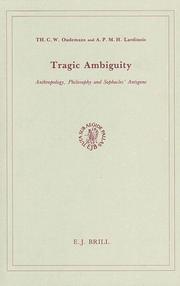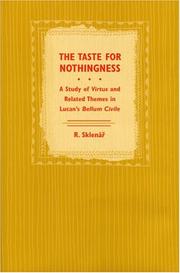| Listing 1 - 3 of 3 |
Sort by
|

ISBN: 9004084177 9004246533 9789004084179 Year: 1987 Volume: 4 Publisher: Leiden : Brill,
Abstract | Keywords | Export | Availability | Bookmark
 Loading...
Loading...Choose an application
- Reference Manager
- EndNote
- RefWorks (Direct export to RefWorks)
Philosophical anthropology --- Sophocles --- Ambiguity in literature --- Ambiguïteit in de literatuur --- Ambiguïté dans la littérature --- Antigone (Legendary character) in literature --- Antigone (Personnage de legende) dans la litterature --- Antigone (Sagenfiguur) in de literatuur --- Cosmologie de l'Antiquité dans la littérature --- Cosmology [Ancient ] in literature --- Kosmologie van de Oudheid in de literatuur --- Tragic [The ] in literature --- Tragique [Le ] dans la litterature --- Tragische [Het ] in de literatuur --- Antigone (Greek mythology) in literature --- Cosmology, Ancient, in literature --- Tragic, The, in literature --- Antigone (Mythologie grecque) dans la littérature --- Cosmologie antique dans la littérature --- Tragique dans la littérature --- Sophocles. --- Ambiguity in literature. --- Antigone (Greek mythology) in literature. --- Cosmology, Ancient, in literature. --- Tragic, The, in literature. --- Sofokles --- Sophocle --- Sofocle --- Sophokles --- Sofocles --- Antigone (Mythologie grecque) dans la littérature --- Cosmologie antique dans la littérature --- Tragique dans la littérature --- Ambiguïté dans la littérature --- Antigone --- In literature. --- Sophocles - Antigone
Book
ISBN: 2130493688 9782130493686 Year: 1998 Volume: *16 Publisher: Paris : Presses universitaires de France,
Abstract | Keywords | Export | Availability | Bookmark
 Loading...
Loading...Choose an application
- Reference Manager
- EndNote
- RefWorks (Direct export to RefWorks)
Aardrijkskunde [Klassieke ] --- Atlas classiques --- Classical atlases --- Classical geography --- Cosmologie de l'Antiquité --- Cosmologie de l'Antiquité dans la littérature --- Cosmology [Ancient ] --- Cosmology [Ancient ] in literature --- Geografie [Klassieke ] --- Geography [Classical] --- Géographie classique --- Klassieke aardrijkskunde --- Klassieke atlassen --- Klassieke geografie --- Kosmologie van de Oudheid --- Kosmologie van de Oudheid in de literatuur --- Epic poetry, Greek --- Odysseus (Greek mythology) in literature. --- Cosmology, Ancient, in literature. --- Mythology, Greek, in literature. --- Poésie épique grecque --- Odyssée (Mythologie grecque) dans la littérature --- Cosmologie antique dans la littérature --- Mythologie grecque dans la littérature --- History and criticism. --- Histoire et critique --- Homer. --- Odysseus (Greek mythology) in literature --- Cosmology, Ancient, in literature --- Mythology, Greek, in literature --- Cosmography in literature --- History and criticism --- Homer --- Knowledge --- Cosmology --- Mythology --- Poésie épique grecque --- Odyssée (Mythologie grecque) dans la littérature --- Cosmologie antique dans la littérature --- Mythologie grecque dans la littérature --- Criticism and interpretation --- Mythology [Classical ] --- Poetry --- Epic poetry, Greek - History and criticism --- Homer. - Odyssey --- Homer - Knowledge - Cosmology --- Homer - Knowledge - Mythology

ISBN: 0472113100 Year: 2003 Publisher: Ann Arbor University of Michigan press
Abstract | Keywords | Export | Availability | Bookmark
 Loading...
Loading...Choose an application
- Reference Manager
- EndNote
- RefWorks (Direct export to RefWorks)
Lucan, the young and doomed epic poet of the Age of Nero, is represented by only one surviving work, the Bellum Civile, which takes as its theme the civil war that destroyed the Roman Republic. An epic unlike any other, it rejects point by point the aesthetics of Vergil's Aeneid and describes a society and a cosmos plunged into anarchy. Language was a casualty of this anarchy. All terminological certitudes were lost, including those that traditionally attach to the Latin word virtus: heroism on the battlefield, rectitude in the conduct of life. The Taste for Nothingness traces Lucan's own analytical method by showing how virtus and related concepts operate--or rather, fail to operate--in Lucan's appropriations and distortions of the traditional epic-battle narrative in the philosophical commitment of Cato the Younger and in the personalities of the two antagonists, Pompey and Caesar. Much recent scholarship has reached a consensus that Lucan's literary method is mimetic, that his belief in a chaotic cosmos produces a poetics of chaos. While accepting many of the recent findings about Lucan's view of language and the universe, The Taste for Nothingness also allows an even bolder Lucan to emerge: a committed aesthete who regards art as the only realm in which order is possible. Robert Sklenar is Visiting Assistant Professor of Classical Studies, Tulane University.
Chaotic behavior in systems in literature --- Chaotisch gedrag in de systemen in de literatuur --- Comportement chaotique dans les systèmes en littérature --- Cosmologie de l'Antiquité dans la littérature --- Cosmology [Ancient ] in literature --- Deugd in de literatuur --- Kosmologie van de Oudheid in de literatuur --- Nihilism in literature --- Nihilisme dans la littérature --- Nihilisme in de literatuur --- Vertu dans la littérature --- Virtue in literature --- Virtus (Latijn) --- Virtus (The Latin word) --- Virtus (latin) --- Chaotic behavior in systems in literature. --- Cosmology, Ancient, in literature. --- Epic poetry, Latin --- Nihilism in literature. --- Virtue in literature. --- History and criticism. --- Lucan, --- Rome --- History --- Literature and the war. --- Virtus (The Latin word). --- Cosmology, Ancient, in literature --- Latin language --- History and criticism --- Etymology --- Pypłacz, Joanna. --- Lucan --- Epic poetry [Latin ] --- Civil War, 49-45 B.C. --- Literature and the war
| Listing 1 - 3 of 3 |
Sort by
|

 Search
Search Feedback
Feedback About UniCat
About UniCat  Help
Help News
News